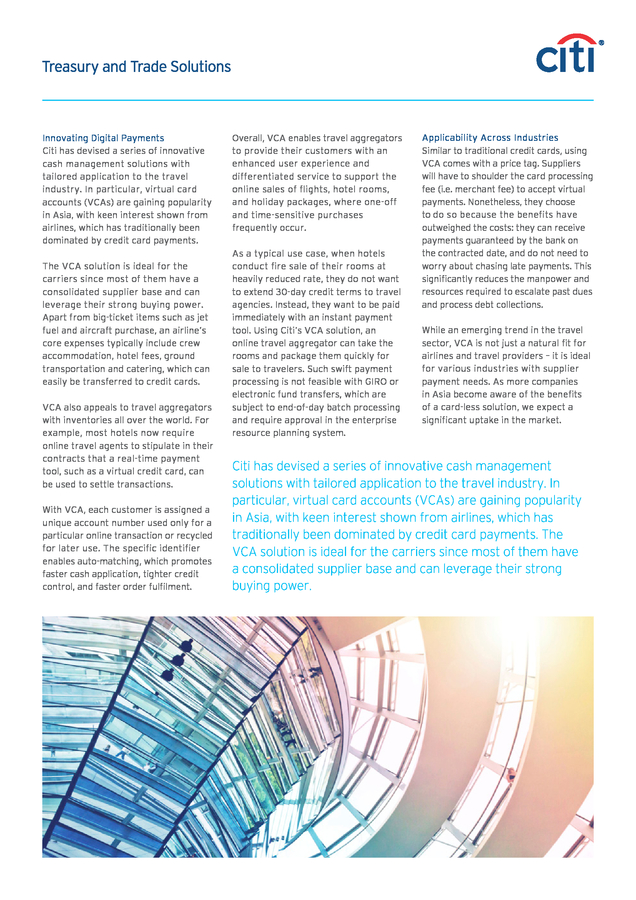Description
Insights | Corporate Clients
Going Virtual: Priorities and Payment
Innovations in the Travel Sector
Despite the recent decline in growth rates in some key Asian markets, including China, the region
continues to grow at rates envy of developed markets of Europe and North America. Over 2015
and 2016, Citi’s economists expect the APAC region to continue to grow at about 6% per annum.
This kind of growth, coupled with a relatively low base of per capita incomes, brings with it a
strong growth in both leisure and business travel.
Taking the simplistic approach of
looking at only the topline growth rate
can create a rosy picture of the travel
and travel related industry.
In truth, the situation is quite a bit
more challenging. With corporate
travel budgets under pressure, and a
spate of unfortunate political and other
events, passenger traffic has been
impacted, creating a degree of
overcapacity in the aviation space.
With an ever-increasing number of
online travel agents, commissions and
fees in the agency business are under
pressure as well. As is usually the case,
the pressure on the topline creates
even more pressure on the bottom line.
Key Treasury and Finance Priorities
To optimize working capital, treasurers
will need to keep abreast of how their
supply chains’ ecosystem, including
distribution, logistics and custom,
continues to evolve.
Having worked with leading companies
in the travel sector, we have identified
the following key priorities for treasury:
• Centralization to gain operational
efficiency
More companies are creating
centralized treasury structures.
For example, setting up buying
centers to consolidate procurement
and negotiate favorable terms for
bulk purchases; and establishing
shared service centers (SSCs) to
streamline payment processing.
• Improving supplier relationships
Companies are always looking for
ways to improve supplier relationships;
as they may lead to a variety of
benefits such as discounted pricing,
reduced terms, faster service and an
overall growth in trust and reliability.
• Enhancing cybersecurity for
treasury and finance management
Cybersecurity is now a top of mind
issue with CFOs and treasurers
as business models, operating
processes, and transaction flows
become more digitized.
With electronic payments becoming de facto for the industry in general, fraud has evolved from targeting individuals or transactions, to targeting databases with large amounts of personally identifiable information (PII) or transaction data. • Mitigating FX risk Online merchants requesting multi-currency settlements require airlines and travel companies to manage funding and foreign exchange (FX) processes. Increasingly, companies are looking at supplier payment solutions that are both operationally and cost efficient from an FX perspective. . Innovating Digital Payments Citi has devised a series of innovative cash management solutions with tailored application to the travel industry. In particular, virtual card accounts (VCAs) are gaining popularity in Asia, with keen interest shown from airlines, which has traditionally been dominated by credit card payments. The VCA solution is ideal for the carriers since most of them have a consolidated supplier base and can leverage their strong buying power. Apart from big-ticket items such as jet fuel and aircraft purchase, an airline’s core expenses typically include crew accommodation, hotel fees, ground transportation and catering, which can easily be transferred to credit cards. VCA also appeals to travel aggregators with inventories all over the world. For example, most hotels now require online travel agents to stipulate in their contracts that a real-time payment tool, such as a virtual credit card, can be used to settle transactions. With VCA, each customer is assigned a unique account number used only for a particular online transaction or recycled for later use. The specific identifier enables auto-matching, which promotes faster cash application, tighter credit control, and faster order fulfilment. Overall, VCA enables travel aggregators to provide their customers with an enhanced user experience and differentiated service to support the online sales of flights, hotel rooms, and holiday packages, where one-off and time-sensitive purchases frequently occur. As a typical use case, when hotels conduct fire sale of their rooms at heavily reduced rate, they do not want to extend 30-day credit terms to travel agencies.
Instead, they want to be paid immediately with an instant payment tool. Using Citi’s VCA solution, an online travel aggregator can take the rooms and package them quickly for sale to travelers. Such swift payment processing is not feasible with GIRO or electronic fund transfers, which are subject to end-of-day batch processing and require approval in the enterprise resource planning system. Applicability Across Industries Similar to traditional credit cards, using VCA comes with a price tag.
Suppliers will have to shoulder the card processing fee (i.e. merchant fee) to accept virtual payments. Nonetheless, they choose to do so because the benefits have outweighed the costs: they can receive payments guaranteed by the bank on the contracted date, and do not need to worry about chasing late payments.
This significantly reduces the manpower and resources required to escalate past dues and process debt collections. While an emerging trend in the travel sector, VCA is not just a natural fit for airlines and travel providers – it is ideal for various industries with supplier payment needs. As more companies in Asia become aware of the benefits of a card-less solution, we expect a significant uptake in the market. Citi has devised a series of innovative cash management solutions with tailored application to the travel industry. In particular, virtual card accounts (VCAs) are gaining popularity in Asia, with keen interest shown from airlines, which has traditionally been dominated by credit card payments.
The VCA solution is ideal for the carriers since most of them have a consolidated supplier base and can leverage their strong buying power. . Top 3 Benefits of the Virtual Card Account (VCA) Solution Enabling Days Payable Outstanding extension As a credit-based product, VCA is a payment guaranteed by the issuing bank and offers users flexibility on the payment period. Settlement of the payment can be stretched to a maximum of 55 days (i.e. two monthly cycles), thus delivering working capital benefits. Operational efficiency gains Offering streamlined processing and automatic reconciliation, VCA is well-aligned with companies’ objectives to establish centralized procurement hubs and SSCs for consolidating and centralizing payables processing. Enriched data optimizing reconciliation Traditional GIRO payments or telegraphic transfers have limited fields to include payment details (i.e. about 20 to 30 characters allowed) for reconciliation.
With VCA, each payment is generated with a unique 16-digit card number, which serves as a reconciliation anchor. Suppliers have the option to fill up to 30 data fields, which can be customized to include payment details such as purchase order number and invoice number. In short, the enriched data improves a supplier’s ability to reconcile the transactions, since the virtual card’s issuing bank provides daily files of the VCA payments, which are integrated into the supplier’s ERP system. With the availability of more data, companies using VCA can write rules or leverage computer programs to search for specific fields (either defined by the bank or the card user) to perform better reconciliation or data analytics. Aman Singh Chadha Asia Pacific Industrials Sub Sector Head Treasury and Trade Solutions, Citi Joshua Williams Asia Pacific Commercial Card Sales and Account Management Head Treasury and Trade Solutions, Citi .
Disclaimer Statements and opinions expressed are those of the author. This communication is intended for reference only and is neither an offer to sell nor the solicitation of an offer to enter into a transaction with Citi. Nothing contained herein constitutes Citi’s opinion. Although the information contained herein is believed to be reliable, Citi makes no representation as to the accuracy or completeness of any information contained herein or provided otherwise.
The ultimate decision to proceed with any related transaction rests solely with you. Citi is not acting as your advisor or agent. This Industry Insight and its contents are proprietary information and assets of Citi and may not be reproduced or otherwise disseminated in whole or in part without our written consent. Treasury and Trade Solutions citi.com/tts © 2015 Citibank, N.A. All rights reserved.
Citi and Arc Design is a registered service mark of Citigroup Inc. CTA4308 October 2015 .
With electronic payments becoming de facto for the industry in general, fraud has evolved from targeting individuals or transactions, to targeting databases with large amounts of personally identifiable information (PII) or transaction data. • Mitigating FX risk Online merchants requesting multi-currency settlements require airlines and travel companies to manage funding and foreign exchange (FX) processes. Increasingly, companies are looking at supplier payment solutions that are both operationally and cost efficient from an FX perspective. . Innovating Digital Payments Citi has devised a series of innovative cash management solutions with tailored application to the travel industry. In particular, virtual card accounts (VCAs) are gaining popularity in Asia, with keen interest shown from airlines, which has traditionally been dominated by credit card payments. The VCA solution is ideal for the carriers since most of them have a consolidated supplier base and can leverage their strong buying power. Apart from big-ticket items such as jet fuel and aircraft purchase, an airline’s core expenses typically include crew accommodation, hotel fees, ground transportation and catering, which can easily be transferred to credit cards. VCA also appeals to travel aggregators with inventories all over the world. For example, most hotels now require online travel agents to stipulate in their contracts that a real-time payment tool, such as a virtual credit card, can be used to settle transactions. With VCA, each customer is assigned a unique account number used only for a particular online transaction or recycled for later use. The specific identifier enables auto-matching, which promotes faster cash application, tighter credit control, and faster order fulfilment. Overall, VCA enables travel aggregators to provide their customers with an enhanced user experience and differentiated service to support the online sales of flights, hotel rooms, and holiday packages, where one-off and time-sensitive purchases frequently occur. As a typical use case, when hotels conduct fire sale of their rooms at heavily reduced rate, they do not want to extend 30-day credit terms to travel agencies.
Instead, they want to be paid immediately with an instant payment tool. Using Citi’s VCA solution, an online travel aggregator can take the rooms and package them quickly for sale to travelers. Such swift payment processing is not feasible with GIRO or electronic fund transfers, which are subject to end-of-day batch processing and require approval in the enterprise resource planning system. Applicability Across Industries Similar to traditional credit cards, using VCA comes with a price tag.
Suppliers will have to shoulder the card processing fee (i.e. merchant fee) to accept virtual payments. Nonetheless, they choose to do so because the benefits have outweighed the costs: they can receive payments guaranteed by the bank on the contracted date, and do not need to worry about chasing late payments.
This significantly reduces the manpower and resources required to escalate past dues and process debt collections. While an emerging trend in the travel sector, VCA is not just a natural fit for airlines and travel providers – it is ideal for various industries with supplier payment needs. As more companies in Asia become aware of the benefits of a card-less solution, we expect a significant uptake in the market. Citi has devised a series of innovative cash management solutions with tailored application to the travel industry. In particular, virtual card accounts (VCAs) are gaining popularity in Asia, with keen interest shown from airlines, which has traditionally been dominated by credit card payments.
The VCA solution is ideal for the carriers since most of them have a consolidated supplier base and can leverage their strong buying power. . Top 3 Benefits of the Virtual Card Account (VCA) Solution Enabling Days Payable Outstanding extension As a credit-based product, VCA is a payment guaranteed by the issuing bank and offers users flexibility on the payment period. Settlement of the payment can be stretched to a maximum of 55 days (i.e. two monthly cycles), thus delivering working capital benefits. Operational efficiency gains Offering streamlined processing and automatic reconciliation, VCA is well-aligned with companies’ objectives to establish centralized procurement hubs and SSCs for consolidating and centralizing payables processing. Enriched data optimizing reconciliation Traditional GIRO payments or telegraphic transfers have limited fields to include payment details (i.e. about 20 to 30 characters allowed) for reconciliation.
With VCA, each payment is generated with a unique 16-digit card number, which serves as a reconciliation anchor. Suppliers have the option to fill up to 30 data fields, which can be customized to include payment details such as purchase order number and invoice number. In short, the enriched data improves a supplier’s ability to reconcile the transactions, since the virtual card’s issuing bank provides daily files of the VCA payments, which are integrated into the supplier’s ERP system. With the availability of more data, companies using VCA can write rules or leverage computer programs to search for specific fields (either defined by the bank or the card user) to perform better reconciliation or data analytics. Aman Singh Chadha Asia Pacific Industrials Sub Sector Head Treasury and Trade Solutions, Citi Joshua Williams Asia Pacific Commercial Card Sales and Account Management Head Treasury and Trade Solutions, Citi .
Disclaimer Statements and opinions expressed are those of the author. This communication is intended for reference only and is neither an offer to sell nor the solicitation of an offer to enter into a transaction with Citi. Nothing contained herein constitutes Citi’s opinion. Although the information contained herein is believed to be reliable, Citi makes no representation as to the accuracy or completeness of any information contained herein or provided otherwise.
The ultimate decision to proceed with any related transaction rests solely with you. Citi is not acting as your advisor or agent. This Industry Insight and its contents are proprietary information and assets of Citi and may not be reproduced or otherwise disseminated in whole or in part without our written consent. Treasury and Trade Solutions citi.com/tts © 2015 Citibank, N.A. All rights reserved.
Citi and Arc Design is a registered service mark of Citigroup Inc. CTA4308 October 2015 .

















